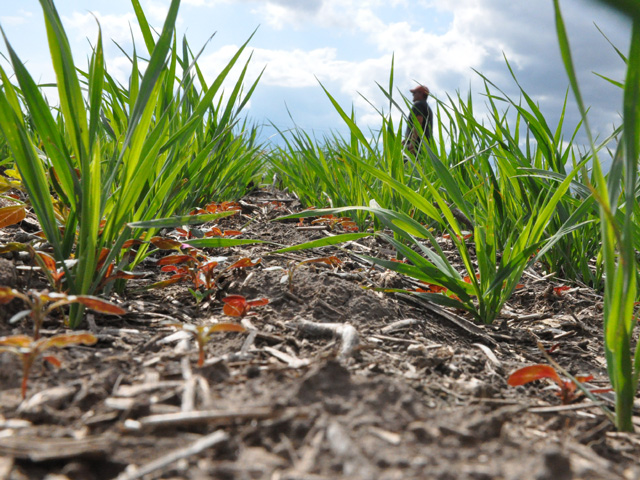DTN Ag Policy Blog
Climate-Smart Commodities Started as a Solution from the Land
This past week's announcement of $2.8 billion in grants for climate-smart agriculture from USDA reflected some of the long-term vision and persistence of guys like Ernie Shea, A.G. Kawamura and Fred Yoder, and other key farm leaders at Solutions from the Land.
Since at least 2009, leaders at Solutions from the Land have been coming back from these United Nations "COP" meetings talking about climate-smart agriculture. They were talking about U.S. agriculture taking a lead on climate change and land management long before it was cool.
SfL put out a report highlighting the "a new and compelling vision for adaptive, resilient land management to meet the multiple goals of the 21st century -- global food and energy security, economic development, biodiversity and climate change," their report stated, laying out the recognition that farmers will be faced with finding tools that will enable them to do more with less.
At a core part of their focus, "Farmers, ranchers, foresters and other land managers will be supported and compensated for their stewardship of ecosystems and a broader suite of ecosystem services the land provides, such as clean water and air, wildlife habitat, biodiversity, and carbon sequestration."
Responding to the 70 projects funded by USDA's Partnerships for Climate Smart Commodities released Wednesday, Shea was able to note, "SfL's vision for how farmers can bring agricultural solutions to climate challenges has begun to be realized" by the announcement. "This is a remarkable and historic accomplishment that ushers in an era of new approaches to enabling agricultural solutions to climate change and other global challenges."
Shea pointed out that as the work begins on climate-smart projects, "it will be important to remember that the ultimate outcomes we seek extend far beyond solutions to climate change." Instead, the objective is to show that "agricultural landscapes are platforms for delivering a whole host of ecosystem services that improve livelihoods, health and well-being."
P[L1] D[0x0] M[300x250] OOP[F] ADUNIT[] T[]
SfL blog on scaling up climate-smart agriculture https://www.solutionsfromtheland.org/…
Not everybody had a similar take on USDA's partnership this week. The environmental group Friends of the Earth, for instance, attacked the projects because of the ties to major corporations across the agricultural supply chain.
"The Biden Administration is right to focus on mitigating climate change, and many of the projects announced today seem worthy of support," said Jason Davison, senior food and ag campaigner for Friends of the Earth. "Unfortunately, several of them will funnel tens of millions of taxpayer dollars to some of the most egregious climate offenders -- Big Ag corporations like JBS, Cargill, and ADM."
Davison added, "USDA handing $60 million taxpayer dollars to Tyson Foods to create 'climate-smart' beef would be like EPA giving a $60 million grant to Exxon to create "green" gasoline. It's a massive corporate giveaway, and it's unacceptable.
"These grants fly in the face of President Biden's executive order calling for USDA to combat consolidation in agriculture. They lay the groundwork for giant agribusinesses to use these projects to greenwash their own emissions and collect tremendous amounts of farm data."
As noted earlier, DTN is part of the Farmers for Soil Health grant project that will look to increase cover crops in conservation tillage in 20 states that produce more than 85% of the country's corn and soybean crops. Part of the goal of that project is to help double cover crop acres nationally.
The Farmers for Soil Health news release stated, "FSH will also work with data insights and publishing company DTN to develop a digital platform that will use satellite imagery, allowing farmers to receive an 'eco-score' for corn and soybeans produced with cover crops and conservation tillage. This platform will facilitate the marketing of crops to parties interested in securing a documented source of sustainably produced corn and soybeans."
A full list of the 70 Partnerships for Climate-Smart Commodities can be found at https://www.usda.gov/…
Also see, "Funding Flows for Climate-Smart Grants," https://www.dtnpf.com/…
Chris Clayton can be reached at Chris.Clayton@dtn.com
Follow him on Twitter @ChrisClaytonDTN
(c) Copyright 2022 DTN, LLC. All rights reserved.




